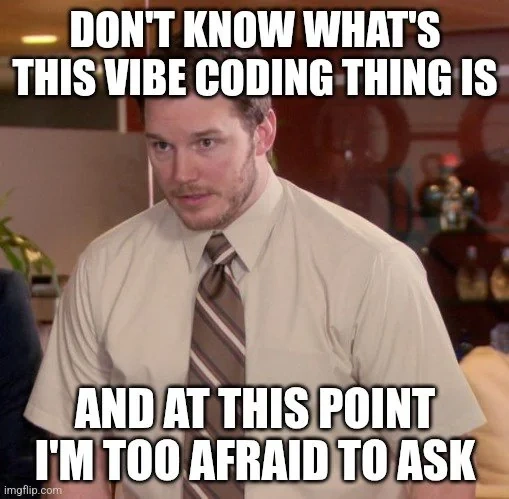Cambridge, MA, USA. Alright, fellow coders and tech junkies, buckle up—it's time to dish the dirt on the latest buzzword that's been clogging up our GitHub feeds: vibe coding. Yes, you heard it right. Vibe coding is being hyped up as the next big thing, but let’s be real—it's nothing more than a flashy PR stunt, a glorified excuse for procrastination that even Andrew Karpathy probably wouldn’t dare tweet about if he had to.

What’s the Hype About?
You know the drill. Some marketing whiz (or a desperate influencer) comes up with a catchy phrase—vibe coding—and suddenly, everyone who’s ever Googled “how to code” starts claiming they’re “vibe coding.” But here’s the tea: if you’re too lazy or too clueless to actually write code, why not just sit back and let the “vibe” do all the work? Spoiler: It won’t. Instead, you end up with a pile of half-baked ideas and a screen full of syntax errors.

Vibe coding is pitched as a revolutionary way to “absorb” code through sheer ambient inspiration, where you just chill, vibe, and let your brain magically fill in the algorithms. But in reality, it’s just a PR stunt designed to sell you on the idea that you can be a coding genius without actually putting in the work. It’s like expecting your compiler to run on autopilot while you binge-watch Netflix. Newsflash: There’s no “Hello World” magic button!

The Procrastination Paradise
Let’s be honest here—vibe coding is essentially a sophisticated way to procrastinate. Instead of spending hours debugging your code, you’re busy watching endless analysis videos and “vibe coding” sessions that promise to turn you into the next coding savant. But if you’re not hands-on with your keyboard, your skills will get rusty faster than you can say “stack overflow.”
Take, for instance, my buddy Chris from Boston. He used to be a decent coder, grinding out clean commits and actually learning from his mistakes. Then he got sucked into the vibe coding hype. Suddenly, instead of practicing his craft, he spent countless hours watching other people “vibe” their way through code. Fast forward a few months—Chris’s live projects went from being sharp AF to a jumbled mess of commented-out code and broken links. His GitHub looked like a landfill of half-implemented features, and his productivity tanked. That, my friends, is the dangerous allure of vibe coding.
Many aspiring developers end up as mere spectators in their own careers, watching others do the hard work while they claim to be “vibing.” The result? A severe decline in problem-solving skills and critical thinking abilities. Instead of wrestling with real bugs and algorithmic puzzles, you’re sitting back, letting someone else do the heavy lifting. And let’s be real, if you’re not willing to put in the time and sweat, you’ll never be anything more than a wannabe coder, stuck in perpetual beginner mode.
This trend is dangerous, especially when it’s marketed as a shortcut to success. It not only misleads people about what it takes to become proficient in coding, but it also undermines the genuine effort required to master the craft.

The Bottom Line
At its core, vibe coding is a laughable concept—a fancy, overhyped term for what is essentially a get-out-of-coding-free card. It’s like saying you can become a master chef by just watching cooking shows, without ever stepping into the kitchen. Sure, the videos might look cool and the lingo might make you feel like you’re in on a secret, but the harsh truth is: real coding requires real effort.
So, my fellow tech enthusiasts, if you’re serious about coding, drop the vibe nonsense and get back to hacking away at those lines of code. There’s no substitute for hands-on experience, debugging at 2 AM, and the sweet satisfaction of a perfectly executed algorithm. Don’t let yourself become just another spectator in the coding world. Get up, log in, and commit to your craft—because that’s how you truly level up.
#VibeCoding #TechTrends #Programming #DeveloperCommunity #GitHub












Finally, someone said it. I'm tired of people talk about "vibe coding" like a real thing. My only learning from all the hype-talk is to learn even more traditional programming and rely even less on LLMs.